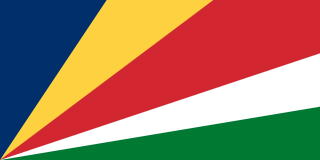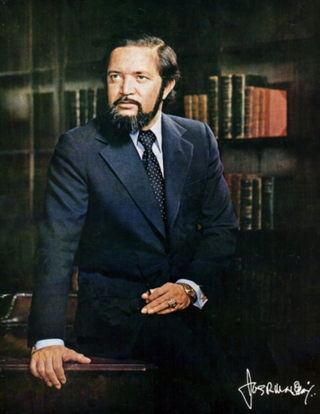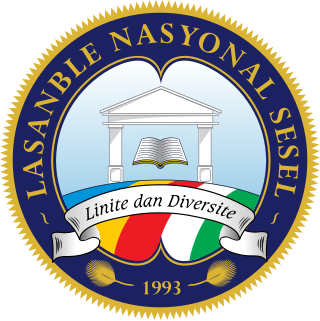
Seychelles, officially the Republic of Seychelles, is an archipelagic state consisting of 115 islands in the Indian Ocean. Its capital and largest city, Victoria, is 1,500 kilometres east of mainland Africa. Nearby island countries and territories include the Comoros, Madagascar, Mauritius, and the French overseas departments of Mayotte and Réunion to the south; and Maldives and the Chagos Archipelago to the east. It is the least populated sovereign African country, with an estimated 2020 population of 98,462.

The politics of Seychelles have historical roots in both one-party socialism and autocratic rule. Following independence from the United Kingdom in 1976, Seychelles was a sovereign republic until 1977, when the original President and leader of the Seychelles Democratic Party, James Mancham, was overthrown in a bloodless coup by the Prime Minister France-Albert René. René installed a single-party socialist state under the Seychelles People's Progressive Front which remained in place until 1993, when multiparty elections took place for the first time since independence. Modern day Seychelles governance takes place in a framework of a presidential republic, whereby the President of Seychelles is both head of state and head of government, and of a multi-party system. Executive power is exercised by the government. Legislative power is vested in both the government and the National Assembly.
Many entities have been called a Constitutional Commission with the general purpose of reviewing a constitution, or planning to create one.

France-Albert René was a Seychellois lawyer, politician and statesman who served as the second President of Seychelles from 1977 to 2004. He also served as the country's 2nd Prime Minister from its independence in 1976 to 1977.

The Chamber of Representatives is the lower house of the Congress of Colombia. It has 172 members elected to four-year terms.

Sir James Richard Marie Mancham KBE was a Seychellois politician who founded the Seychelles Democratic Party and was the first President of Seychelles from 1976 to 1977.
Elections in the Philippines are of several types. The president, vice-president, and the senators are elected for a six-year term, while the members of the House of Representatives, governors, vice-governors, members of the Sangguniang Panlalawigan, mayors, vice-mayors, members of the Sangguniang Panlungsod/members of the Sangguniang Bayan, barangay officials, and the members of the Sangguniang Kabataan are elected to serve for a three-year term.

Wavel Ramkalawan is a Seychellois politician and Anglican priest who has been serving as the president of Seychelles since 26 October 2020. Ramkalawan was an opposition MP from 1993 to 2011 and 2016 to 2020. He also served as the Leader of the Opposition from 1998 to 2011 and 2016 to 2020. On 25 October 2020, Ramkalawan won the presidential election, the country's first such victory for an opposition candidate since independence, marking its first successful peaceful transition of power.

The unicameral National Assembly is the Seychelles's legislative body.

The Election Commission is an independent government agency and the sole election management body of Thailand. It oversees government elections as well as referendums throughout the Kingdom of Thailand. Established by the 2007 Constitution, the Election Commission (EC) has extensive powers to manage, oversee, and regulate the electoral process. The EC has reacted to irregularities in the 2000 Senate elections, the 2006 House elections, and the 2007 House elections, forcing re-elections and disqualifying many candidates.
The Seychelles Movement for Democracy was a political party in Seychelles. It was active in the early 1990s. Its leader was Jacques Hodoul.

The Constitution of Georgia is the supreme law of Georgia. It was approved by the Parliament of Georgia on 24 August 1995 and entered into force on 17 October 1995. The Constitution replaced the Decree on State Power of November 1992 which had functioned as an interim basic law following the dissolution of the Soviet Union.
Articles related to Seychelles include:

The history of Seychelles dates back to the fourth of the Portuguese India Armadas led by Vasco da Gama, though Seychelles was likely already known to Arab navigators and other sailors for many centuries. On 15 March 1503, the scrivener Thomé Lopes noted the sighting of an elevated island, doubtless one of the granitic islands and almost certainly Silhouette Island. The first recorded landing was by the men of the English East India Company ship Ascension, which arrived in Seychelles in January 1609.The islands were claimed by France in 1756. Seychelles remained uninhabited until the first settlers arrived on board the ship Thélemaque, which arrived on 27 August 1770. Captain Leblanc Lecore landed the first colonists, comprising 15 white men, eight Africans and five Indians. The Seychellois Creole language developed as a means of communication between the different races. The British frigate Orpheus commanded by Captain Henry Newcome arrived at Mahé on 16 May 1794. Terms of capitulation were drawn up and the next day Seychelles was surrendered to Britain. Following the fall of Mauritius to British forces, Captain Phillip Beaver of the Nisus arrived at Mahé on 23 April 1811 and took possession of Seychelles as a permanent colony of Britain. The Seychelles became an independent republic in 1976. Following a coup d'état, a socialist one-party state ruled the country from 1977 to 1993. The subsequent democratic Presidential elections were won by candidates of the same party.

A constitutional referendum was held in Seychelles on 15 November 1992. Although the proposed new constitution received the support of 54.6% of voters, it failed to pass the 60% threshold required for adoption. Subsequently, a second constitutional commission was created and a second draft put to a referendum the following year.

Parliamentary elections were held in Seychelles from 29 September to 1 October 2011. The elections were boycotted by all the main opposition parties. As a result, the People's Party won 33 of the 34 seats in the National Assembly.

Presidential elections were held in Seychelles between 3 and 5 December 2015. As no candidate received more than 50% of the vote in the first round, a second round was held between 16 and 18 December. Incumbent President James Michel was re-elected, defeating opposition leader Wavel Ramkalawan by just 193 votes in the second round. Ramkalawan claimed there had been "many irregularities", including vote buying.

General elections were held in Seychelles on 22–24 October 2020 to elect the President and members of the National Assembly. The National Assembly elections had been due in 2021, but in July 2020 were brought forward by President Danny Faure in order to hold them together with the presidential elections, a proposal supported by opposition parties.

From 1979 to 1991, Seychelles was ruled by France-Albert René and the Seychelles People's Progressive Front as a one-party state. During this time the state built one of Africa's highest gross domestic products per capita.













